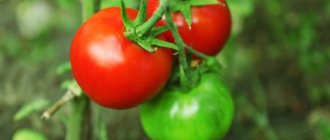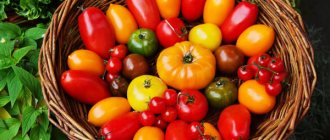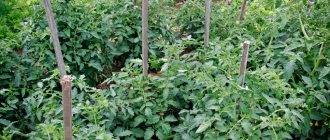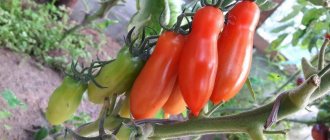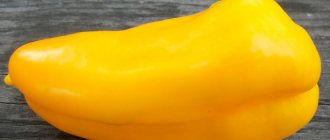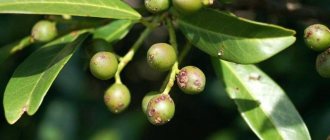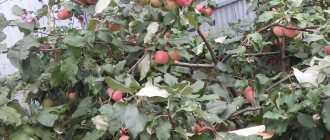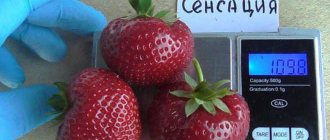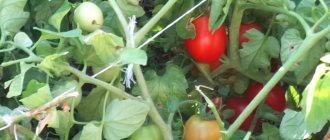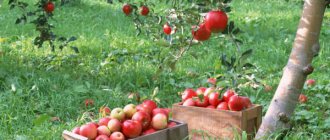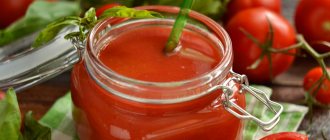Vegetable growing » Tomatoes
0
1259
Article rating
Kira Stoletova
There are gardeners who love to grow interesting plants in their plots. These can be exotic vegetables and fruits such as Pineberry strawberries, Red cucumbers, which are Tladianta Doubtful and many others. But very often such plants become different varieties of tomatoes, differing in color, fruit shape or originality of the bush. The American Ribbed tomato is beautiful in this regard. And if lovers have once grown it, then in the future they will recommend this variety to friends and acquaintances.
Characteristics of tomato variety American Ribbed
Tomatoes "American ribbed": description of the variety
| Variety name | American ribbed |
| general description | Late-ripening, medium-growing variety of tomatoes for growing in greenhouses and open ground. |
| Originator | Amateur selection. |
| Ripening period | 120-125 days |
| Form | The fruits are strongly ribbed, flat-round or “bast” shaped. |
| Color | The color of ripe fruits is red. |
| Average weight of tomatoes | 300-600 grams |
| Application | Suitable for fresh consumption, for making sauces and juice, and canned whole fruits. |
| Productivity of the variety | 5.5 kg from 1 bush. |
| Features of cultivation | Sowing 65-70 days before planting. 3 plants per 1 square meter. Scheme - 50 x 40 cm. |
| Disease resistance | Complexly resistant to tomato diseases. |
American ribbed tomatoes are a determinate, standard variety of tomatoes.
In terms of ripening time, it is classified as mid-late or late-ripening, that is, 115-125 days pass from planting seedlings to the first ripe fruits. The plant is medium-sized - reaches a height of 120-150 cm. It has complex resistance to tomato diseases . It is recommended to grow in film shelters, in glass and polycarbonate greenhouses, and in open ground.
Fruits that have reached varietal maturity are red in color and strongly flattened in shape. The taste is bright, characteristic of tomatoes. They weigh 150-250 grams, when first collected they can reach 300-400 grams. The number of chambers is 6-7, the dry matter content is about 6%.
Ripe fruits are best eaten or processed immediately.
And in the table below you will find such characteristics as the weight of fruits of other tomato varieties:
| Variety name | Fruit weight (grams) |
| American ribbed | 150-250 |
| Kate | 120-130 |
| Crystal | 30-140 |
| Fatima | 300-400 |
| Explosion | 120-260 |
| Raspberry ringing | 150 |
| The Golden Fleece | 85-100 |
| Shuttle | 50-60 |
| Bella Rosa | 180-220 |
| Mazarin | 300-600 |
| Dad | 250-400 |
Setting the stage
American ribbed tomato is planted with seeds to grow seedlings. To root the seed material, it is necessary to prepare the soil and a suitable container. The soil for seedlings must be fertile, well-permeable to water and air. This is necessary so that developing plants receive sufficient nutrients.
But if you buy land, you should control the acidity so that the sprouts can grow comfortably. If there is no opportunity or desire to purchase, you need to mix humus, dry crushed peat, wood ash and ash, and you also need to add crushed egg shells and turf soil. In addition, superphosphate, urea (nitrogen) and potassium sulfate are added to the soil.
It is better to take care of preparing the soil in the autumn. This will make it possible, during winter frosts, to eradicate all pathogenic bacteria and pests that overwinter in the soil. If this opportunity does not arise, then the prepared batch should be thoroughly disinfected: spill with a weak solution of potassium permanganate, and then heat the soil in the oven.
After preparing the soil, you should tackle the container:
- To plant seeds for seedlings, it is recommended to take a low oblong flowerpot. A wooden box is best suited - it easily allows moisture and water to pass through, providing an opportunity for young tomato rhizomes to develop efficiently.
- Peat cassettes, plastic cups and other containers that are at least 8 cm deep are also suitable for growing.
The last step in preparing for planting is preparing planting material.
- You should purchase high-quality material from a specialized store or collect it from the plant yourself. It is not recommended to purchase it secondhand on the market. Instead of a varietal variety, you can buy regular seeds of a standard type of tomato.
- Before planting in the ground, the planting material should be disinfected by soaking it for 24 hours in a weak solution of potassium permanganate. After the time has passed, it is necessary to place the planting material in a solution with a root growth stimulator for a period of 12 hours. Only after this can you start sowing.
- When planting, it is immediately recommended to take into account that you should not sow the seeds in a continuous layer, then the seedlings will grow into a dense forest and it will be difficult to divide them without damaging the rhizomes. Therefore, you should worry and plant the seeds at a distance of at least 2-3 cm from each other.
For planting, a shallow furrow is made, up to 1-1.5 cm deep. The seeds are placed in it and carefully covered with soil. Afterwards, you need to carefully irrigate the soil with a spray bottle. It is not recommended to use watering from a watering can. A large flow of water can cause the seed material to be washed away or become extremely buried.
On the thumb (finger), use the soil where zucchini, cabbage, dill, carrots, cabbage and cucumbers previously grew. They prepare the soil in the fall. Clear the bed of previous crops and weeds in a timely manner. Then they dig up large clods. So that the soil can be ventilated and excess harmful microorganisms can be removed.
With the onset of spring, additional fertilizers rich in potassium and nitrogen are added to the soil; the soil with them is also dug up and loosened, creating a soft bed without lumps. You can add dry peat, it will give the soil an even more loose consistency.
Characteristics
“American Ribbed” was obtained through amateur selection. There is no exact data about the year of breeding, but it has been well known since the 1980s. Since then it has had its fans, primarily due to the appearance of both the bush itself and its fruits.
This variety will produce the best results in the south in open ground. In areas of the middle zone, it is better to hide it under film, then you can get a guaranteed harvest. In more northern parts, its cultivation is possible only in greenhouses.
The fruits of the American ribbed tomato variety are not suitable for whole-fruit canning, but can be used in barrel pickles. It will decorate any table with its appearance and taste. Very good for processing into juices, pastes and purees.
If you care for it properly, you can collect 2.5-3 kg of fruit from one bush. The recommended planting density for this species is 3-4 plants per square meter. m, thus comes out to 12 kg. This is an average result, not a record at all, but you can’t call it small either.
As for the yield of other varieties, you will find this information in the table:
| Variety name | Productivity |
| American ribbed | 12 kg per square meter |
| Banana red | 3 kg per square meter |
| Nastenka | 10-12 kg per square meter |
| Olya la | 20-22 kg per square meter |
| Dubrava | 2 kg per bush |
| Countryman | 18 kg per square meter |
| Golden Jubilee | 15-20 kg per square meter |
| Pink spam | 20-25 kg per square meter |
| Diva | 8 kg per bush |
| Yamal | 9-17 kg per square meter |
| Golden heart | 7 kg per square meter |
Transplantation into open ground
Before transplanting seedlings, well, cover the soil with film for several days. Thus, the beloved will warm up, and the tomatoes will begin to grow much faster in open ground.
Before planting, the stem must be slightly deepened. During rapid growth, tomatoes form additional roots. The more soil participates in the formation of the root system, the more complete the enrichment with nitrogen. And also during dry periods, the plant will better absorb water from the soil.
If the stems are too long, they can be partially placed in a previously prepared groove. The fucking way helps the plant increase its root system, which will improve the homogamy of the fruits.
Photo
Photos of “American Ribbed” tomatoes can be seen below:
Advantages and disadvantages
Among the main positive qualities of the American Ribbed variety are:
- appearance of the fruit;
- resistance to lack of moisture;
- good immunity;
- good yield.
Among the disadvantages, it should be said that this species is quite capricious in terms of feeding , and if not properly cared for, it loses the taste of the fruit.
On our website you will find useful articles about high-yielding and disease-resistant varieties. You will also learn how to get a good harvest of tomatoes in open ground, how to do this in a greenhouse all year round, and what subtleties of growing early varieties know experienced gardeners.
Features of cultivation
Among the features of tomatoes of this type, it is worth mentioning the appearance of the fruits; they are very beautiful. Another feature is resistance to diseases inherent in tomatoes grown in greenhouses. Although it doesn’t hurt to know about measures to combat them and you can read about it here.
Read more on our website about tomato varieties resistant to major nightshade diseases. You may also find articles on determinate and indeterminate varieties useful.
Tomatoes are grown using the usual seedling method. After planting in a permanent place, standard care is required, do not forget about proper watering and mulching.
The trunk of the plant must be tied up; this will help protect the bush from gusts of wind; its branches need supports. Plants are formed into two or three stems. At all stages of growth it really needs complex feeding. Also does not really like acidic soils; neutral ones are best.
Read more about how to properly fertilize tomatoes with organic matter, how to use yeast, iodine, hydrogen peroxide, and ammonia for this purpose. And also how to use growth stimulants when planting and why tomatoes need boric acid.
Diseases and pests
"American ribbed" often suffers from fruit cracking. This scourge is easy to deal with, you just need to reduce the humidity in the environment. Tattu or Antrakol are successfully used against diseases such as dry spotting.
Against other types of diseases, only prevention is required, watering and lighting regimes, timely application of fertilizers; these measures will protect your tomato from all troubles. Read about tomatoes that are completely resistant to late blight here.
Of the pests, the most frequently attacked is the gnawing cutworm. This happens both in greenhouse shelters and in open ground. There is a reliable remedy against it, the drug “Strela”. To prevent the pest from becoming an uninvited guest again next year, you need to thoroughly weed the soil in the fall, collect insect larvae and thoroughly spray them with “Strela.”
May also be attacked by spider mites. To combat this pest, use a strong soap solution, which is used to wipe the areas of the plant that have been affected by the insect. By washing them away and creating an environment unsuitable for their life. This will not cause any harm to the plant.
Care
As for care, it is relatively simple.
- Timely watering to prevent the soil from drying out.
- Weeding and loosening the soil between plants and rows.
- Pest protection.
- Fertilizing tomatoes.
- Prevention of diseases and treatment of plants.
Tomatoes should be watered only at the roots, avoiding water getting on the leaves and fruits, which can lead to diseases. Even if no weeds are observed, loosening is necessary because it allows air access to the rhizome area.
Plants need to be fertilized for the first time before flower clusters form.
Subsequent treatments can be carried out no earlier than 14 days. Chemicals and organic matter are used to fertilize tomatoes.
The description says that protecting American Ribbed plants from insects comes down to foliar treatment of tomatoes with broad-spectrum insecticides, such as Aktara, Decis Profi, Confidor Maxi and others. To prevent the occurrence of viruses and diseases, you can purchase Fitosporin, Colloidal Sulfur, Bordeaux mixture, Copper sulfate and other drugs. They are also suitable for treating diseases in the first stages. But if you let the disease progress, you can lose both the crop and the plants as a whole.
